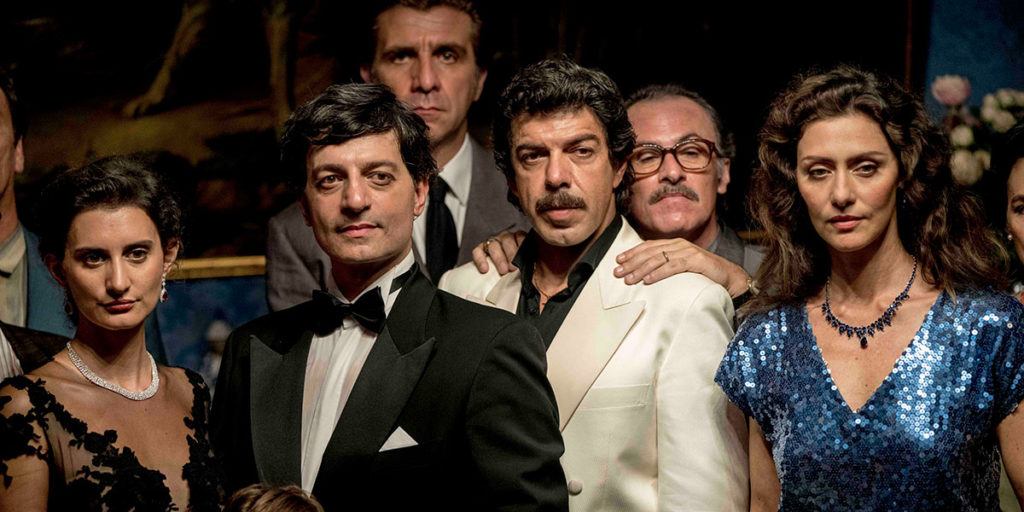The Traitor

Photo courtesy TIFF.
In the 1970’s, the organized crime syndicate Cosa Nostra (“Our Thing”) expanded from Palermo, Sicily, into a global narcotics enterprise. With this change from its roots as a protection racket shrouded in secrecy, mythologized as modern day samurai, came a deluge of violence. In 1987, Tommaso Buscetta (Pierfranceso Favino) became the first mafia boss to become a state informant.
Written and directed by Marco Bellocchio, THE TRAITOR tells the story of the man from Corleone whose testimony and depositions revealed the structure and operations of the Sicilian mob and led to 366 arrests, including in 2006 Bernardo Provenzano, il Capo di Tutti Capi (“Boss of All Bosses”)—the head of the Corleonesi, and inspiration for Mario Puzo’s novel and Coppola’s film adaptation of The Godfather.
A low-level cigarette smuggler in the 1940’s, Buscetta rose to power in the 60’s and fled to the Americas, where he set up a narcotics trafficking network in Brazil. Following his extradition in 1972, he spent eight years in prison before fleeing back to Brazil just as Toto Riina (Nicola Cali) and Bernardo Provenzano escalated the Second Mafia War against the Palermo families. In the opening scenes of THE TRAITOR, we see a sequence of assassinations of Riina’s enemies.
While publicly berating his son for his drug addled state, leaving his two sons to languish in Palermo as he and his wife Maria (Maria Fernanda Cândido) depart for Brazil, privately Buscetta wants them to lead lives independently of his affairs. During his extradition, two-thirds of they way through a twelve-hour flight back to Rome, he has nightmares and visions of Antonio and Benedetto (Paride and Gabriele Cicirello); in 1993, Salvatore Cancemi (Ludovico Caldarera) confessed to strangling them. Haunted by the image, he cooperates with Italian prosecutors and Judge Giovanni Falcone (Fausto Russo Alesi), for a reduced sentence—three years.
Bellocchio’s film enriches characters with dialogue, as in a protracted exchange of barbs between Buscetta and Pippo Calo (Fabrizio Ferracane), head of the Porta Nuovo family from which the former ascended.
“Responding to threats will suspend this cause,” warns a Judge at trial.
Calo rebuffs, “You call these threats?”
Before returning to Italy to avenge Judge Falcone’s death, Buscetta, his wife and youngest children try life in Ft. Collins, Colorado. His friend, Salvatore “Totuccio” Contorno, also flips. During one trial, around Christmas of ’84, he too struggles with the mundanities of normal life—in his case, a car salesman.
“It was like a conversation between two deaf-mutes,” says Tommaso of his friend’s earnest attempt to pitch a Cadillac to a finicky customer.
Totuccio replies, “I don’t even speak Italian¹, let alone English!”
Unable to adjust, Buscetta insists on returning to Italy. Maria, at this point supplying the family’s only earned income, refuses, “I’m not leaving, nor is Stefano. He has school and I have work.”
Her body language is that of an equal, whether calm while dangled from a military helicopter in Brazil in ’72, or discussing their future while passing along a cigarette—symbolizing partnership given the nature of Buscetta’s first criminal enterprise. It parallels the strength in both silence and vociferousness of Sicilian wives throughout the film, whose devotion isn’t so much to Cosa Nostra as it is to immediate family, preserving whatever remains of an ages-old duty protecting the helpless—their children.
And that too, we suspect, is Buscetta’s one regret, at least the way this fictionalized account tells it.
“I didn’t even even grant them the freedom to betray me,” laments Buscetta of his decision not to tell his two eldest where he was, leaving them nothing to trade with Cancemi to spare their own lives.
The film glosses over the real Buscetta’s infidelities—the root of his tensions with the Sicilian mafia—and leaves relatively bare the portrayal of his third wife beyond these fleeting moments from which we infer a deeper relationship. If the intent was indictment of toxic masculinity at its worst extreme, Bellocchio had the opportunity to pare back visual metaphors—ferocious lions, tigers, and hyenas, whose food is usually put on the table by the female—and invest directly in Maria as a whole person.
In spite of these flaws and a few superfluous inserts or editing choices, e.g. particular dates or countdowns that while interesting seem unnecessary, THE TRAITOR remains legitimately compelling for much of the film’s 145 minutes—more than any other mafioso narrative in recent memory.
- Totuccio, like Buscetta a native of Palermo, only speaks Sicilian, which is a separate language from Italian.